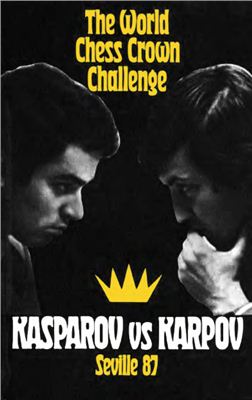Raduga, 1988.— 162 с.
Перевод с русского О. Зильберт. Приведены все партии матча с комментариями Д. Бронштейна.
Garri Kasparov was bo in 1963. He became an Inteational Grandmaster in 1980, Soviet Champion in 1981 and World Champion in 1985. He is the winner of four "Chess Oscars", his FIDE rating as of 1st July, 1987, is 2740.
Anatoly Karpov was bo in 1951. He became an Inteational Grandmaster in 1970, Soviet Champion in 1976 and 1983. Karpov held the world title from 1975 to 1985. He has won nine "Chess Oscars", his FIDE rating as of 1st July, 1987, being 2700.
Kasparov's seconds: Alexander Nikitin, USSR Merited Coach, Iosif Dorfman and Sergei Dolmatov, both Inteational Grandmasters, and also Zurab Azmaiparashvili, Inteational Master.
Karpov is seconded by the Inteational Grandmasters Igor Zaitsev and Konstantin Leer and the Inteational Masters Mikhail Podgayets and Elizbar Ubilava.
The competitor who scores at least 12.5 points or wins six games is the winner of this 24-game match. If the score of the match is even (12: 12), the World Champion retains his title.
The prize fund of the-match amounts to two million eight hundred thousand Swiss francs.
This is the fourth match for the world title between these two players. Their first (unlimited) competition (September 1984—February 1985) was interrupted by FIDE President Florencio Campomanes without declaring a winner, when the score was +5 –3 =40 in favour of Karpov. The second and third contests were won by Kasparov, the scores being +5 –3 =16 and +5 –4 =15 respectively. Before the Seville Match the players had met each other over the chess-board one hundred times exactly, the total score being +13 –12 =75 in favour of Kasparov.
David Bronstein, an outstanding Inteational Grandmaster, once a Challenger himself, illuminates the underlying philosophy of each game of this exciting contest.
For the benefit of our readers, we also present notes by eminent Grandmasters who covered the match in the chess media, some notes (marked Ed.) have also been added by the editors expressly for the benefit of beginners.
ISBN 5-05-002349-1
Перевод с русского О. Зильберт. Приведены все партии матча с комментариями Д. Бронштейна.
Garri Kasparov was bo in 1963. He became an Inteational Grandmaster in 1980, Soviet Champion in 1981 and World Champion in 1985. He is the winner of four "Chess Oscars", his FIDE rating as of 1st July, 1987, is 2740.
Anatoly Karpov was bo in 1951. He became an Inteational Grandmaster in 1970, Soviet Champion in 1976 and 1983. Karpov held the world title from 1975 to 1985. He has won nine "Chess Oscars", his FIDE rating as of 1st July, 1987, being 2700.
Kasparov's seconds: Alexander Nikitin, USSR Merited Coach, Iosif Dorfman and Sergei Dolmatov, both Inteational Grandmasters, and also Zurab Azmaiparashvili, Inteational Master.
Karpov is seconded by the Inteational Grandmasters Igor Zaitsev and Konstantin Leer and the Inteational Masters Mikhail Podgayets and Elizbar Ubilava.
The competitor who scores at least 12.5 points or wins six games is the winner of this 24-game match. If the score of the match is even (12: 12), the World Champion retains his title.
The prize fund of the-match amounts to two million eight hundred thousand Swiss francs.
This is the fourth match for the world title between these two players. Their first (unlimited) competition (September 1984—February 1985) was interrupted by FIDE President Florencio Campomanes without declaring a winner, when the score was +5 –3 =40 in favour of Karpov. The second and third contests were won by Kasparov, the scores being +5 –3 =16 and +5 –4 =15 respectively. Before the Seville Match the players had met each other over the chess-board one hundred times exactly, the total score being +13 –12 =75 in favour of Kasparov.
David Bronstein, an outstanding Inteational Grandmaster, once a Challenger himself, illuminates the underlying philosophy of each game of this exciting contest.
For the benefit of our readers, we also present notes by eminent Grandmasters who covered the match in the chess media, some notes (marked Ed.) have also been added by the editors expressly for the benefit of beginners.
ISBN 5-05-002349-1

